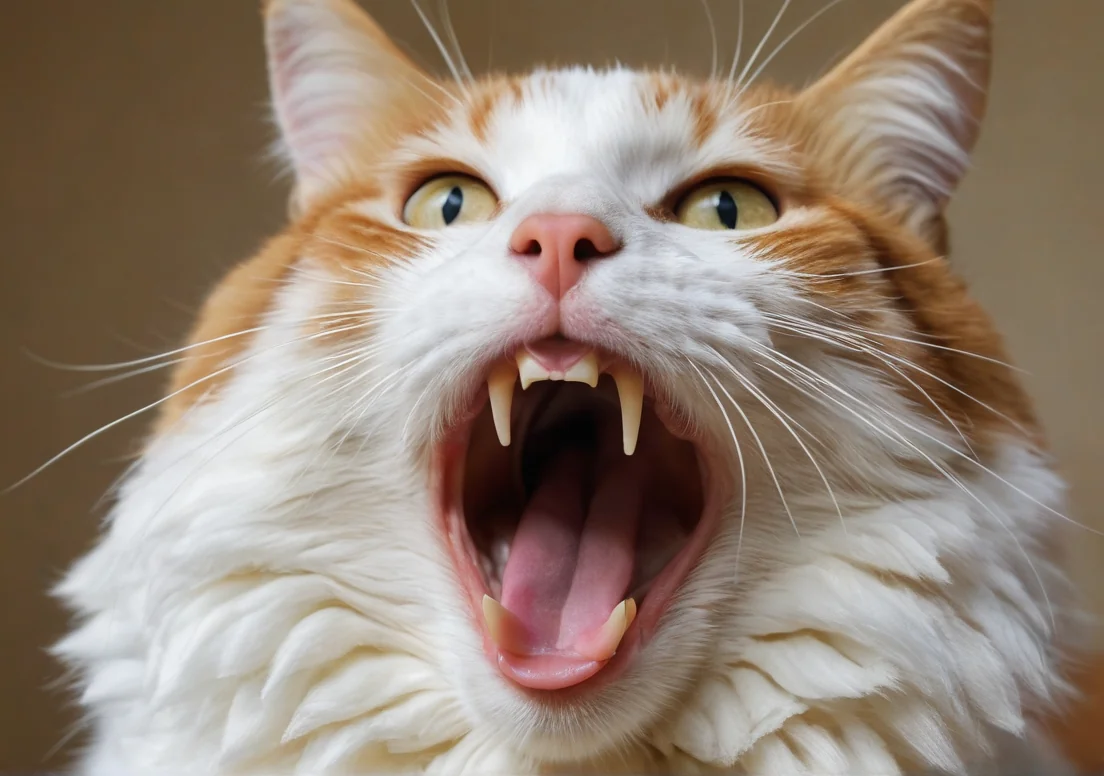Cats are fascinating creatures, but when you see one foaming at the mouth, it’s hard not to feel alarmed. This unusual and concerning behavior raises questions that many pet owners face, and it’s essential to understand what might be happening.
A cat may foam at the mouth due to several reasons, including dental issues, poisoning, or a severe underlying health condition like epilepsy. There’s a lot more to unravel about this alarming symptom, and you must know the potential causes and what actions to take next, so stick around for some crucial insights!

What Are the Common Reasons for Foaming?
A cat foaming at the mouth can be quite alarming. It might look unsettling, but understanding the underlying causes can help you address the issue effectively.
One common reason for this symptom is nausea or vomiting. When a cat is feeling queasy, it may produce more saliva, leading to a foamy appearance. This could stem from various triggers like dietary indiscretion or hairballs.
Another reason could be anxiety or stress. Cats are sensitive creatures, and when they’re upset—whether from a loud noise or a visit to the vet—they may foam at the mouth as a stress response.
Additionally, exposure to toxins can be a serious cause. Substances like antifreeze or certain plants can cause poisoning, leading to excessive drooling and foaming. Always keep an eye on your cat’s environment to minimize these risks.
Another less common, but noteworthy, cause is feline rabies. Rabies can lead to aggression, seizures, and foaming due to neurological effects. If you suspect rabies, it’s critical to seek veterinary help immediately.
Lastly, seizures can result in foaming as well. During a seizure, a cat may lose control over bodily functions, including salivation, which leads to foam at the mouth.
Being aware of these potential causes can guide you in assessing your cat’s health and knowing when to seek veterinary assistance.
Can Dental Problems Cause Foaming?
Absolutely, dental issues can lead to foaming at the mouth. Tooth decay or severe gum disease not only causes pain but can also result in excess salivation. As a cat struggles with oral discomfort, it may drool significantly, which can sometimes appear foamy.
Gum disease, or periodontal disease, leads to inflammation of the gums and surrounding tissues. This often results in bacteria breeding in the mouth, producing additional saliva and leading to foaming. If gum disease progresses and establishes an abscess, the situation could escalate to serious health risks.
Signs of dental issues may include:
- Bad breath: If your cat’s breath smells foul, it could indicate oral problems.
- Difficulty eating: Watch for hesitation or reluctance when it comes to food.
- Excessive drooling: This often accompanies oral pain.
- Swollen gums: Tenderness in the mouth can lead to noticeable gum swelling.
Keeping up with routine dental check-ups is crucial. Regular brushing and using dental treats can also help maintain your cat’s oral health, preventing conditions that lead to foaming and discomfort. If you notice any signs of dental trouble, don’t hesitate—reach out to your vet for a thorough examination.
What Should You Know About Poisoning Risks?
Poisoning is a serious issue that could cause your cat to foam at the mouth. This distressing symptom often signals an emergency, so it’s essential to know what might be lurking around your home. Common household toxins include cleaning products, certain food items (like chocolate or onion), and various plants such as lilies or azaleas, which are highly toxic to cats.
If you suspect poisoning, look for other signs like vomiting, diarrhea, or lethargy. It’s also crucial to check if your cat has accessed any harmful substances. If you see any unusual behavior or symptoms, contact your veterinarian immediately or call a local animal poison control hotline. As a precautionary measure, always keep potentially dangerous items out of reach and familiarize yourself with safe plants and pet-proof cleaning supplies. Your feline’s safety starts with awareness; being informed can make a big difference in their wellbeing.
How Does a Seizure Affect Your Cat?
Seeing your cat foam at the mouth can be alarming, especially if it coincides with a seizure. Seizures can cause a variety of strange symptoms, and foaming may occur due to uncontrolled muscle contractions and excessive drooling. While seizures can stem from various causes—such as epilepsy, head trauma, or infections—the foaming itself is a physical response.
During a seizure, the brain goes into chaotic overdrive, disrupting normal function. This neurological disarray can lead to confusion, loss of consciousness, and uncontrolled movements. If your cat has a seizure, keep them safe from injury by removing obstacles in their vicinity, and avoid putting anything in their mouth, as that could cause harm. Always consult your vet right after a seizure—tracking frequency and duration can be critical for diagnosis and treatment.
Another consideration is the potential for underlying health issues causing the seizures. Conditions like liver disease or metabolic disorders may contribute. Regular vet checkups and monitoring your cat’s behavior can help identify any changes early on. Keeping a record of any episodes, including their length and your cat’s condition afterward, can provide invaluable information for your veterinarian.
Are There Other Health Conditions to Consider?
Foaming at the mouth in cats isn’t just an alarming sight—it can signal underlying health issues that need attention. While many might jump to conclusions about rabies, this is just one possibility among several others.
Dental Disease is a common culprit, often overlooked. An infection or severe gum disease can lead to excessive salivation and foaming. If your cat’s breath suddenly stinks or they seem to be pawing at their mouth, it’s worth a visit to the vet.
Toxins also play a major role. Ingesting plants toxic to cats, such as lilies or azaleas, or chemicals like antifreeze, can lead to serious symptoms including foaming. Always keep hazardous items out of reach and be aware of what’s in your home.
Neurological issues can be involved as well. Conditions like epilepsy may lead to excessive drooling during a seizure.
Regular vet checkups can help catch these issues early, so don’t skip those appointments. Keep a watchful eye on any sudden changes in your cat’s health, as they can hint at more serious conditions that require prompt treatment.
What Immediate Actions Should You Take?
Noticing your cat foaming at the mouth can be jarring, and knowing how to respond quickly and effectively is crucial.
First, stay calm. Your cat can sense your stress, and a quiet approach helps. Evaluate the situation—check if they’ve eaten anything unusual, like houseplants or toxic foods.
To tackle possible toxins, if you suspect your cat may have ingested something harmful, it’s essential to contact your veterinarian immediately. Don’t try to induce vomiting without professional advice; it could make matters worse.
If your cat seems disoriented, lethargic, or has any other concerning symptoms alongside the foaming, getting them to an emergency vet becomes even more urgent.
While waiting for help, keep your cat in a quiet space, away from loud noises and disturbances. Comfort them gently, without grabbing or making sudden moves which could cause stress.
Lastly, keep any evidence of what they might’ve ingested handy—this information can be invaluable to your vet in providing appropriate care.
What Are the Long-Term Implications?
Foaming at the mouth in cats isn’t just alarming; it can indicate serious health issues that may have long-term effects. Underlying conditions, like rabies, poisoning, or severe dental disease, should be diagnosed and treated promptly. Rabies is fatal once symptoms appear, so immediate veterinary care is crucial if rabies is suspected.
Chronic stress or anxiety could also lead to foaming, potentially resulting in ongoing health challenges. Just like in humans, prolonged stress in cats can lead to behavioral issues, weakened immune systems, and conditions like interstitial cystitis or other gastrointestinal problems. If foaming is symptomatic of a chronic issue, regular veterinary check-ups become vital to monitor your cat’s health and catch any further complications early.
Additionally, neurological disorders might present with similar symptoms. Depending on the cause, this could lead to coordination problems, seizures, or worse. Ongoing monitoring and tailored treatment are essential to ensure your cat remains comfortable and can maintain a good quality of life.
Interesting Cat Behavior Facts
Cats are often seen as independent creatures, but their behavior can reveal a lot about their emotional state. Stress is a significant factor influencing health, and interestingly, anxiety can manifest in various physical ways, including foaming at the mouth.
Did you know that a cat’s purring isn’t always a sign of contentment? Cats may also purr when they’re anxious or in pain, seeking comfort. Similarly, sudden changes in a cat’s environment — like moving homes or introducing new pets — can trigger anxiety, sometimes leading to unusual behaviors like foaming.
Another fascinating tidbit: cats are sensitive to smells, and certain scents can stress them out. Strong odors from cleaning products or even certain foods can cause distress, which might lead to excessive drooling or foaming.
To minimize stress, consider creating a comforting environment for your cat with cozy hiding spots and familiar scents. Understanding these behaviors can help you respond more effectively to your cat’s needs, ensuring a happier, healthier companion. Identifying sources of stress and addressing them proactively is key in helping your cat thrive.
Alex, a passionate animal lover, has experience in training and understanding animal behavior. As a proud pet parent to two dogs and three cats, he founded AnimalReport.net to share insights from animal experts and expand his knowledge of the animal kingdom.




